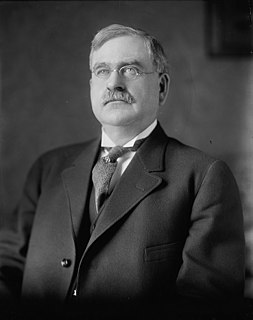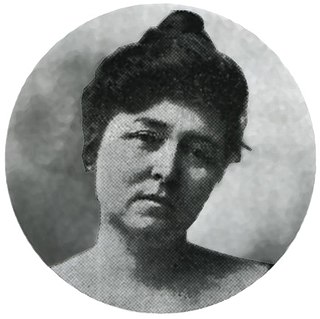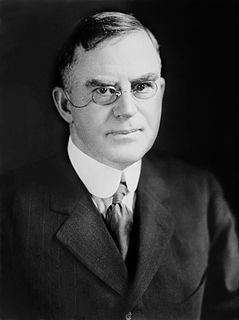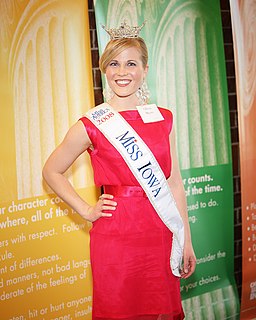The Iowa State Council for Defense was created by Iowa Governor William L. Harding one month after the United States entered World War I, and was disbanded soon after the end of the war. It became a focal point of various political battles conducted in the name of loyalty and Americanism.

William Lloyd Harding was an American Republican politician. He was the 22nd Governor of Iowa, from 1917 to 1921.

World War I, also known as the First World War or the Great War, was a global war originating in Europe that lasted from 28 July 1914 to 11 November 1918. Contemporaneously described as, "the war to end all wars," it led to the mobilisation of more than 70 million military personnel, including 60 million Europeans, making it one of the largest wars in history. It is also one of the deadliest conflicts in history, with an estimated nine million combatants and seven million civilian deaths as a direct result of the war, while resulting genocides and the resulting 1918 influenza pandemic caused another 50 to 100 million deaths worldwide.
Its original mission was to "assist in working out the plan for conscription in Iowa and on other war measures as required from time to time by the government." [1] Unlike its counterpart in Minnesota (the Minnesota Commission of Public Safety), the Council was officially an advisory body with no formally delegated powers. [2] Governor Harding refused the Council's request that he convene a special session of the Iowa General Assembly to grant the Council legal standing and money to spend. [3]

The Iowa General Assembly (IGA) is the legislative branch of the state government of Iowa. Like the federal United States Congress, the General Assembly is a bicameral body, composed of the upper house Iowa Senate and the lower Iowa House of Representatives respectively. The Senate consists of four year terms and the House consists of two year terms. The General Assembly convenes within the Iowa State Capitol in Des Moines.
Its history was short, but stormy. The Des Moines Daily News reported that "[t]he meetings of the council were irregular, infrequent and always star chamber proceedings. . . . From the beginning, dissension featured the meetings, and long before the close of the war one-half of the membership ceased to attend the sessions." [3] One of the Council's members, Iowa Homestead editor James M. Pierce, accused his colleagues on the Council of conducting a "reign of terror" to drive the Nonpartisan League from Iowa. [4] [5]

The Nonpartisan League (NPL) was a political organization founded in 1915 in the United States by Arthur C. Townley, former organizer for the Socialist Party of America. On behalf of small farmers and merchants, the Nonpartisan League advocated state control of mills, grain elevators, banks and other farm-related industries in order to reduce the power of corporate political interests from Minneapolis, Minnesota and Chicago, Illinois.
To chair the Council, Governor Harding chose Lafayette Young, the editor and publisher of The Des Moines Capital. Young had been appointed as an interim U.S. Senator in November 1910 immediately upon the death of Senator Jonathan Dolliver, but was defeated by William Squire Kenyon in the special legislative election in the Iowa General Assembly the following April.

Lafayette ("Lafe") Young was a newspaper reporter and editor, and (briefly) a Republican Senator from Iowa.
As the Council's chairman, Young urged that "disloyal" persons should be impoverished and imprisoned, arguing that "[a]ny man who has lived under the protection of our laws and has accumulated wealth and is now disloyal should be deprived of every dollar he possesses and he should be interned in a stockade until the end of the war and at that time his fate should be considered carefully." [6] He also campaigned against the teaching of any foreign language in any public school or college, and for the imposition of English literacy tests for voting. [7]

A literacy test assesses a person's literacy skills: their ability to read and write. Literacy tests have been administered by various governments to immigrants. In the United States, between the 1850s and 1960s, literacy tests were administered to prospective voters, and this had the effect of disenfranchising African Americans and others.
In May 1917, the Council approved the official state flag of Iowa, designed by Dixie Cornell Gebhardt, so that Iowa regiments could have a flag of their own in addition to the American flag. [8]

Dixie Cornell Gebhardt was a state regent and secretary of the Daughters of the American Revolution (DAR) in Iowa during World War I, and designed the flag for the state of Iowa.
The Council disbanded in January 1919, two months after the end of the war. [3]











